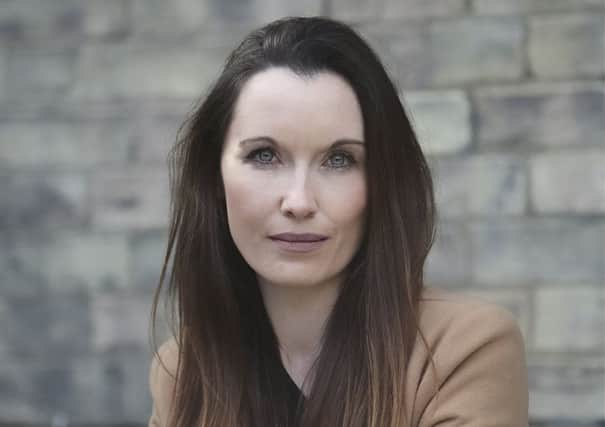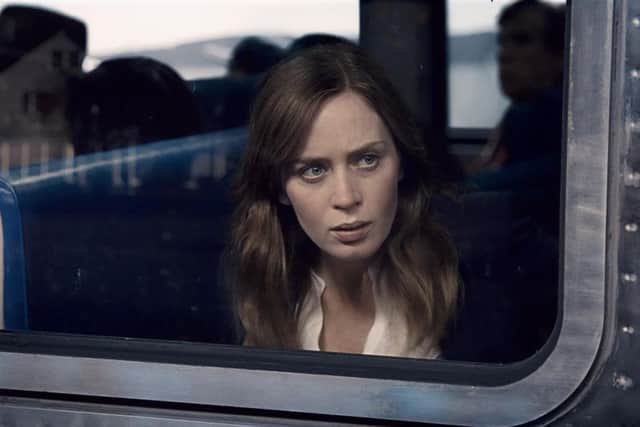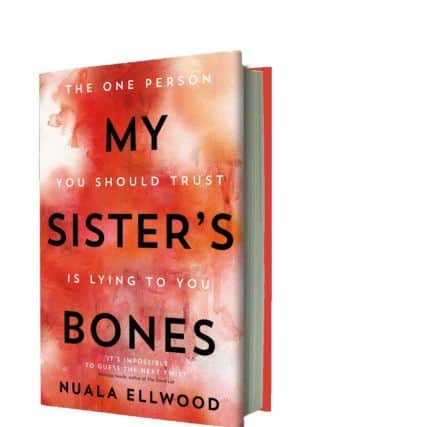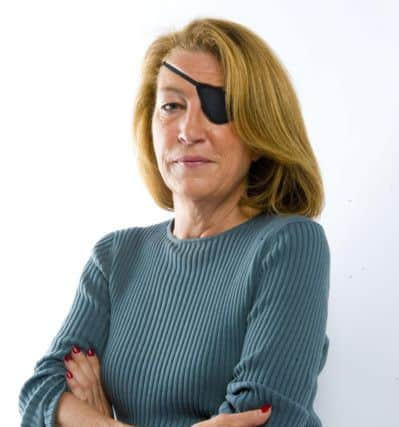Meet the Yorkshire author whose debut thriller could be bigger than The Girl on the Train


IF THIS interview was like Nuala Ellwood’s new thriller, My Sister’s Bones, it would be full of twists, have an unreliable narrator and be shot through with lies. Here, instead, is the very trustworthy set-up.
It is ten o’clock on a bitterly cold morning in York. We are cocooned inside the Fossgate Social, a place of industrial chic, hissing espresso-makers and clattering cups. Everything is bright and pleasant, but we are at the dark end of the street – not Fossgate, but the place where Nuala takes her mind.
Advertisement
Hide AdAdvertisement
Hide AdThe York writer’s new thriller features a gravely troubled female war reporter. Nuala, who is 38, did an upsetting degree of research into war and trauma for this novel.


“For about six months while I was looking at it in extreme depth, I started getting anxious,” she says, black coffee untouched. “Some images will stay with me forever and are horrific.”
She had long wanted to write about this character, she says, and became fascinated with female war reporters after a chance meeting with Marie Colvin. The Sunday Times foreign correspondent gave a talk at the Chelsea Art Club where Nuala worked in her early twenties.
“She talked about the experiences she had been through and they were extremely haunting and they stayed with me,” she says. Colvin was killed in Syria in 2012 and Nuala’s imagination was further fired by an obituary written by Colvin’s sister.
Advertisement
Hide AdAdvertisement
Hide Ad“There was a big age gap between them and she talked about how her sister would tell her these wonderful stories. She used to give her postage-stamp kisses and tell her to dream. I thought it was a lovely image.”


Nuala thought then that it would be interesting to tell a story about two sisters – “one who’s gone off and battled injustice and gone all round the world; and the other who’s stayed at home but had to battle her demons, too”.
My Sister’s Bones is a psychological thriller with touches of the horror story. It is also a novel about tensions between sisters and the different memories they carry of an abusive childhood.
Much of the novel is told through the eyes of Kate, a big-name war reporter. She returns from the unending horror of Aleppo to the old horrors of Herne Bay, staying in her childhood home shortly after the death of her mother. Her sister, Sally, is an alcoholic wrapped in fumes and bitterness, or so it seems from Kate’s perspective.
Advertisement
Hide AdAdvertisement
Hide AdKate has witnessed much in her working life, yet is not a constant witness. Her mind is ravaged and she is suffering from post-traumatic stress disorder. She is dogged by memories of a little boy from Aleppo and becomes obsessed with the fate of a boy next door to her mother’s house, and the reader is pulled into Kate’s hallucinatory nightmares.


To say more would spoil a story with many layers – and a few nasty surprises up its sleeve. Nuala has a 10-year-old son and this accounts for the presence in the novel of two young boys.
“For me the main thing that made me want to write this was being a mother. Whenever I have watched the news from Aleppo, it is the children that really get to me. I wanted to show the parallels of a child there and a child in the West – it’s just fluke of chance that we are born here into relatively safety.”
Although My Sister’s Bones is billed as a debut thriller, Nuala has published two earlier novels, Soho, 4am and Summer Lies Bleeding. She wrote those books as Nuala Casey. There is a bit of a publishing buzz about Nuala. The Observer picked her as one of the “New Faces of Fiction” and interviewer Kate Kellaway spoke of a “formidable debut novel that rivals The Girl on the Train as a compulsive read (and beats it for style)”. My Sister’s Bones is Nuala’s first crime novel. “The others were more literary... I feel with this I’ve come into my stride and it’s definitely more my natural style.”
Advertisement
Hide AdAdvertisement
Hide AdFor her new novel, Nuala did a research trip to Herne Bay one February, marvelling at how cheap the room was. “That’s because it’s Herne Bay in February,” her husband, artist and illustrator Nick Ellwood, told her.


Nuala was drawn to this coroner of Kent by the light as much as anything, fitting for a story filled with long shadows. “It’s a wonderful setting. Turner used to paint there and the light is really interesting because it makes shadows of people – it’s quite eerie.”
Nuala lives now near the river in York, but she grew up in a large house between Darlington and Stockton. It needed to be big as she is the youngest of five siblings. Her father is the broadcaster Luke Casey, who commuted to the BBC in London for 15 years while she was growing up, and later made the Dales Diary programme for Tyne Tees. There is quite a lot of childhood suffering in the novel but none of it drawn from experience.
“My childhood was extremely happy,” says Nuala. “That’s the wonderful thing about being a writer. You’re not writing autobiographies. It’s fiction and this is a story.
Advertisement
Hide AdAdvertisement
Hide Ad“Writing about something you’ve been through is one thing, but it’s lovely to get a character who is totally different to you. You can get inside them and wonder what they would do, particularly the two sisters, because their voices are so different.”
Edgar Allan Poe is name-checked as an influence. “When I was reading into post-traumatic stress syndrome and it’s a night-time thing, the nightmares and visitations, it made me think of the Raven, that macabre bird that visits this man as he is going over his book of lore. And it’s almost like the war reporter going over his memories.”
Nuala is now working on a second thriller, called Little Shadow. “It’s about a woman who wakes up in hospital with no memory of being there and she finds out her little daughter is dead and her husband has gone missing with all the money – and sold their house, so she has to start again,” she says.


“And she encounters this very mysterious woman. They build up a relationship and end up going on a trip to Belgium, and their whole life just goes in a different direction and it’s very dark.”
Advertisement
Hide AdAdvertisement
Hide AdAh, darkness again. Nuala laughs and says that My Sister’s Bones was even darker, until her editor at Penguin gently steered her away from macabre excess.
Nuala has Irish roots thanks to her father, with family in Co Mayo, and her name means “fair shouldered one”. She works part-time at York St John University, teaching creative writing to MA students, and teaches also a module on dystopian fiction. Her own university days were spent studying sociology at Durham University, but with literature add-ons, crafting a degree to suit her interests.
Nuala always shows her proofs to her father and is filled with admiration for the way he could “write this amazing stuff in a very short space of time”.
A piece of advice he gave has been never forgotten. “Words have value,” he said. And those valuable words have stayed with her.